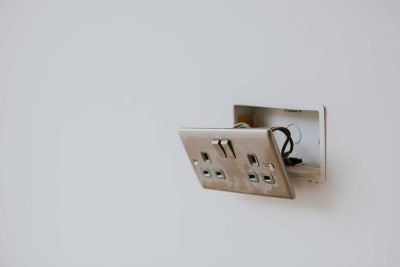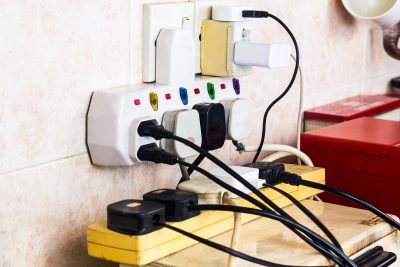To prevent electrical fires in your home, practice regular maintenance and safe usage habits. Check your wiring, outlets, and circuit breakers often to identify potential hazards early. Follow the manufacturers’ instructions for appliances and avoid overloading outlets.
Upgrading outdated systems, like aluminum wiring or old panels, is a smart investment in safety. By taking these steps and having professionals like us from TurnKey Electricals inspect your home, you can create a safer living environment for your family. Want help getting started? Reach out to our team—we’re here to make your home safer and more secure.

Electrical fires arise from various electrical hazards, the majority of which can be avoided through routine maintenance and caution. By knowing the most common causes, we can identify hazards and take the necessary precautions to avert them. Here is a brief description of some common electrical fire hazards.
Faulty old wiring is a major cause of house fires, more so in older homes that simply cannot handle today’s electrical demands. Extension cords are used excessively, thus overloading circuits and causing overheating. The circuits need constant checking by a licensed electrician for fraying wires and an upgrade-proof old system.
Increased risk of electrical fires may arise from the way overloading kiosks subject them to heightened levels of heat. Households use well over 50 devices at any one time and share the load on various circuits, and
Appliances like toasters and space heaters can overheat and pose a fire hazard if left unattended. Space heaters can cause overheating to outlets and circuits when turned to high settings; therefore, they should be run at lower settings.
Extension cords are only for temporary use. Long-term use of extension cords in high-traffic areas or big appliances may expose live wires. Find alternatives to extension cords wherever possible to improve lighting.
Rodents and other pests can chew wiring, resulting in exposed live conductors and increasing fire hazards. Regular pest control and sealing of entry points will help protect wiring.
Loose plug connections can cause arcing, generating heat that can ignite adjacent materials. Replacing the damaged outlets and ensuring a snug fit for cords will eliminate this hazard.
Place space heaters on stable, non-combustible surfaces, away from all combustibles. Due to high power draw, do not plug into extension cords or power strips.
Candles and smoking materials are fire hazards. Keep them away from outlets and flammable materials to lessen the chances of ignition.
Preventing electrical fires in the home starts with knowing where the dangers lie and taking responsible precautions to protect your home and family. We identify important ways to make sure your home is fire-safe.
Inspect hidden wiring every few years, especially in older houses. Look for deterioration in wiring, flickering lights, or frequently tripped breakers, and replace damaged wiring immediately.
Do not overload outlets, and do not connect power strips in a daisy chain configuration. Install GFCI outlets in damp places and regularly test them.
Use extension cords for temporary purposes only; never under carpets or through doorways. Choose one that matches the wattage of your appliances to prevent overheating.
Unplug appliances that are not regularly used and check power cords for damage. Run space heaters at half-power to reduce the stress on the outlets.
Arc-fault Circuit Interrupters will terminate the electrical supply to prevent fire from damaged wires. These should be installed in every bedroom as well as in the living room for more protection.
Remove easy combustibles away from electrical sources to prevent fires from starting, especially around stoves and outlets.
Well, your wiring should qualify for such an upgrade if it is more than 40 years old.
Smart plugs and outlets help monitor power usage and alert you to possible overloads for better safety and energy efficiency.
Work with a licensed electrician for compliance with local codes and carry out regular inspections for safety status.
Encourage family members to recognize electrical hazards, get smoke alarms tested, and practice fire escape plans at least twice a year.

Safe outlet usage is crucial for keeping your space safe from electrical fires. Outlets are designed to handle a certain load safely. If you go beyond those limits or otherwise neglect maintenance, you will overheat and create catastrophic and often deadly failures.
Overloading outlets is a major cause of electrical fires. Plugging in too many devices or using a power strip improperly can cause unwanted heat buildup. Avoid using in-line adapters for heavy appliances, such as refrigerators and microwaves.
For extension cords, use 12 or 14 AWG cords for heavy loads and look for 16 AWG cords for lighter ones, which can safely handle up to 1,375 watts. The installation of Ground-Fault Circuit Interrupters (GFCIs) in kitchens and bathrooms greatly minimizes shock hazards by cutting off electricity when there is a fault.
Light fixtures and lamps can be fire hazards if not used properly. Always observe the limit indicated on the fixture for maximum wattage, as exceeding that wattage can lead to overheating and sparks. Ensure the new lighting device is marked by Nationally Recognized Testing Laboratories (NRTL).
Defective outlets account for 69 % of electrical fires. Cracked or scorched outlets require rapid replacement, and the old-fashioned two-pronged outlets should not be used. It’s best to use grounded three-prong outlets for extra protection and to lower fire risk.
Taking the initiative to be electrical fire safe begins with the mindset that safety comes first. Here are some key resources to help protect your home from these hazards:
A local fire department is resourceful for free or low-cost home safety checks that would indicate fire hazards, including electrical fires. Know the smoke alarm placement advice and their workshops in fire safety.
Customize your escape plan considering the current layout of your home and practice regular drills so that everyone knows what to do in case of an emergency.
It is important to hire a qualified electrician as soon as possible. This will keep your household safe. Every decade or so, an electrical inspection should be done for things like old wiring or overloaded circuits that could result in a fire.
Safety devices such as Ground Fault Circuit Interrupters should only be installed by certified electricians, especially in kitchens and bathrooms, which are two risk areas for electrical accidents. Upgrade to arc-fault circuit interrupters and have and use intelligent surge protectors that could cut the power supply if any problems occur.
Reputable organizations such as the National Fire Protection Association (NFPA) post online effective safety tips regarding electrical safety guidelines. Those include simple practices from unplugging unused appliances up to proper space heater use, as well as lists that can help you evaluate some conditions of your requirement with the electrical system of your house.
Fire prevention will reduce the occurrence of damage when it has already happened, owing to early measures. Home and family will, therefore, get assurance from the proper use of outlets and regular inspection. Know the risks and prevent them by creating a secure environment.
Let us help you solve your electrical problems—call our team at TurnKey Electricals today. Our licensed electricians are here to keep your home safe from electrical fires. Let’s work together to provide a safer, energy-efficient living space!